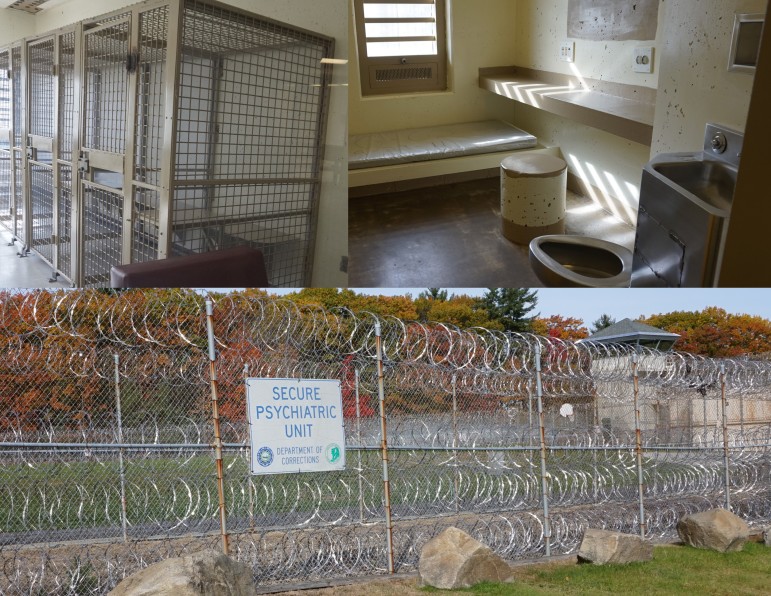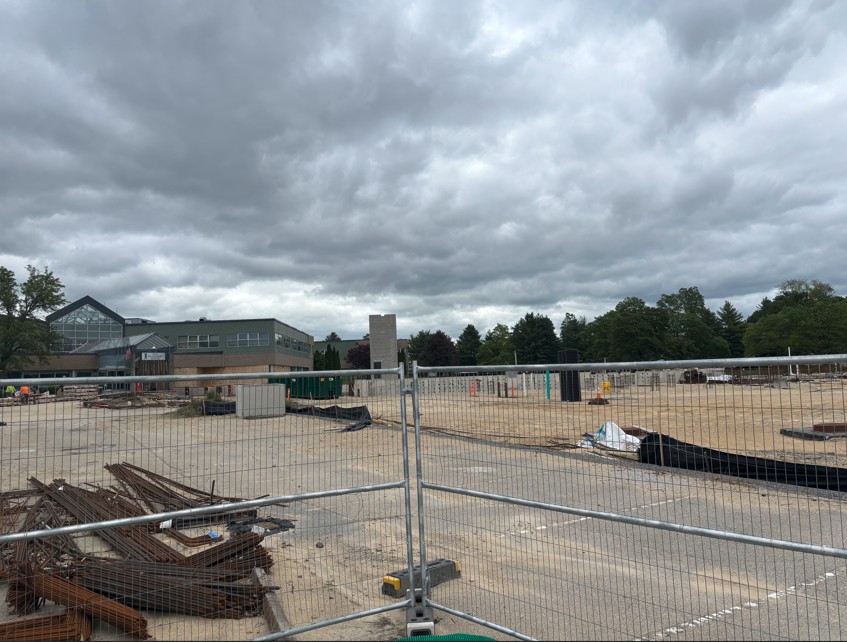
By PAULA TRACY, InDepthNH.org
CONCORD – While prospective patients of a state’s new secure forensic hospital continue to wait in prison as construction of a new forensic psychiatric hospital is built, a foundation design error was discovered during construction and has temporarily paused some work, state officials said.
“At this time, the Division of Public Works, contractor, and design consultants are actively working on a solution while progress continues in other areas of the project. Given the magnitude of the project, the Attorney General’s Office is supporting the Division with its efforts to resolve any outstanding issues,” said Charles M. Arlinghaus, commissioner of the Department of Administrative Services.
The state broke ground on the new facility off Clinton Street near the state’s main psychiatric hospital, the New Hampshire Hospital in Concord in August, 2023 and it was supposed to be completed in 2025.
Funding for the $43 million hospital was approved by the state’s Executive Council using funding from the post COVID-19 recovery American Rescue Plan Act.
Moving the Secure Psychiatric Unit out of the state Prison for Men has been controversial over the years ever since it opened on the grounds of the men’s prison.
The two-year construction project was awarded to PC Construction of Portland, Maine the winning the contract bidder. A request for comment from the company has not been returned since Wednesday.
The governor addressed the question and said “there are some construction issues that have come up that are being addressed and we are working with the Attorney General’s Office on them. The Department of Health and Human Services is working in conjunction with the Attorney General’s office on that.”
“I am not a construction expert but there are some issues that have arisen there on some of the work that has been done, so that is why it’s ceased right now as we evaluate that work. The Attorney General’s Office is involved along with Health and Human Services so that the work can be done properly which is important,” she said.
Asked about the delay, Ayotte said she was told it will have some impact on when the new hospital is delivered.
The state uses the prison for in Concord for men and women for housing people who have not been convicted of a crime but have been deemed too dangerous to themselves or others to be held at the New Hampshire Hospital. When the new secure forensic hospital is complete state officials said those individuals will be moved to the new facility.
When ground was broken on the facility, Timothy Whitman, chief operations officer for New Hampshire Hospital, said there will be about 300,000 square feet built on two stories for two units which will be on the grounds of the New Hampshire State Hospital off Clinton Street in Concord and 150 new state employees needed to operate the facility.
The therapeutic hospital will care for both male and female patients but all will be adults as the state recently opened Hampstead Hospital for children.
Former Gov. Chris Sununu said at the groundbreaking that the hospital will be built adjacent to New Hampshire Hospital and create a setting for skilled psychiatric treatment for forensic patients in a safe, secure, and therapeutic environment.
He thanked the legislature for its bipartisan approach to solving the problem and said families of the patients in the prison will also benefit.
This will serve those families and “folks that just need the right and appropriate level of care that, to date, the state just hasn’t been able to provide.
“We have always said we are making a commitment to fulfill that promise. And finally, we are fulfilling it,” Sununu said.
Sununu said it will be a state-of-the-art-facility and is an extension of New Hampshire Hospital which is the centerpiece of acute mental health care in the state.
At its outset, Weaver said the new building would mark an exciting opportunity to build out the state’s 10 year-mental health plan.
“It’s important to remember that the people we serve are all part of someone’s family,” said Weaver. “The forensic hospital addresses a critical, unmet need in our state and for the first time in recent memory New Hampshire will have a facility dedicated to individuals living with a mental health condition or involved in the criminal justice system that have not been convicted of a crime.”
For her department she said in 2023 “we take comfort that forensic patients will receive treatment with dignity and without a stigma. This is a historic day for New Hampshire and it has been a long time coming.”
Just how long that will take and whether the state continues with this contract and its subcontractors is not yet known.
In 2019, former state Rep. Renny Cushing, D-Hampton, told the House Criminal Justice and Public Safety Committee that it was time to turn the Secure Psychiatric Unit at the men’s prison over to the control of the Department of Health and Human Services, a battle he fought for decades arguing it was unconstitutional to incarcerate mentally ill people in the state prison who hadn’t been convicted of a crime.
The problem really dates back more than three decades when the Secure Psychiatric Unit unit was opened behind the walls of the state prison in Concord and staffed by corrections officers and run like a prison, said Cushing, who died March 7, 2022, at age 69.
At the 2019 hearing, Cushing quoted psychiatrist Dr. Joseph H. Sack’s testimony to a legislative committee in 1985 warning of the problems such an arrangement would make.
“The reason for this concern is that the prime purpose of the Department of Corrections is not treatment and that treatment could be overwhelmed by other concerns,” according to Sack’s written testimony.
Sack was also concerned that because of its location, it would be considered part of the prison.
“Because of the Secure Psychiatric Facility’s proximity to the state prison and even its staffing being from the Department of Corrections, the New Hampshire Psychiatric Society feels that civilly committed patients should not be treated there,” Sack testified.
Presently, some civilly committed patients are housed in the unit with mentally ill prisoners and those deemed incompetent to stand trial and not guilty by reason of insanity.
Sack’s testimony went on to say that patients would feel stigmatized and noted that it could raise constitutional issues and lead to litigation.
Family members turned out to tell the committee what had happened to their loved ones in the Secure Psychiatric Unit. And an organization called Ethical Treatment for the Mentally Ill grew to be effective advocates, One of the co-funders Beatrice Coulter had briefly worked at SPU and was horrified but what she saw there. She and co-founder Wanda Duryea have been strong advocates ever since.





